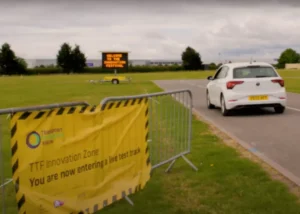Kerbside management company Grid Smarter Cities has welcomed the publication of a new report into how digitalisation could improve management and data integration of the kerbside, predicting it will help make the kerb a key enabler to achieving sustainable and inclusive infrastructure.
The Department for Transport’s Kerbside Management Discovery research project looked at the current situation on the kerbside, which it described as “chaotic, dysfunctional and unsafe” because of extensive illegal and non-compliant activity at the kerbside. Researchers from Deloitte Digital noted that this is a growing issue because the kerbside is facing new and increased demands, for example from new forms of mobility and expansion in online delivery services, along with a vast increase in kerbside electric vehicle charge points and more use of micromobility.
“Grid Smarter Cities has been a long time champion of the benefits of unlocking a dynamic and flexible kerbspace with a focus on the critical needs of the freight servicing and delivery sectors allied with a detailed understanding of the local authorities network and highways management duties,” the company’s Strategic Partnership Director Toby Hiles told Highways News. “We welcome the report and the direction of travel from the DfT with the digitisation agenda set to unleash a raft of new innovation taking kerbside management to a whole new level.”
Grid Smarter Cities predicts digitalisation and booking of kerbside slots will unlock the considerable potential of what can now be considered as a three-dimensional asset to be optimised and commoditised and able to deliver reduced congestion and improved air quality as well as being able to complement and shape Net Zero and decarbonisation strategies and policies. Booking of these slots is accommodated by Grid Smarter Cities’ Kerb Platform.
It points to the transition to Electric Vehicles, which it predicts will be led by the commercial fleet sector which will need availability and ease of access of EV charging infrastructure. This will need to include on-street infrastructure enabling Light Goods Vehicles to ‘graze’ across the network as they deliver.
“The kerbside will not sit in isolation but will be part of a connected, mid to last mile ecosystem which will incorporate depot charging and repurposing of off-street assets,” added Mr Hiles. “A bus depot with EV charging infrastructure is an asset, under-utilised during the day when the buses are out, so we are expanding the Kerb platform to offer up this booking functionality.”
Neil Herron, CEO & Founder commented: “Grid Smarter Cities was delighted to have been part of the expert panel for this report. Its timely release highlights the huge benefits kerbside management can deliver to our town and cities right now, which will only be accelerated and amplified by the roll out of the National Parking Platform, and Digital Traffic Regulation Orders.”
Mr Herron added, “The kerbside has become an essential part of the nation’s transport infrastructure and a major contributor to the UK economy through its function in enabling access for people, goods and public transport. Focusing on operating kerbside as a national asset could be a key enabler to achieving sustainable and inclusive infrastructure that meets the needs of users as well as present and future demand.”
Read the report and about its background here
(Picture – Grid Smarter Cities)






















